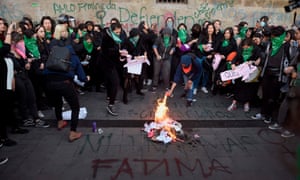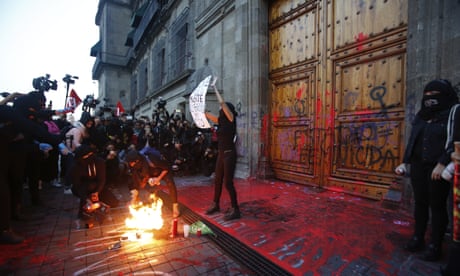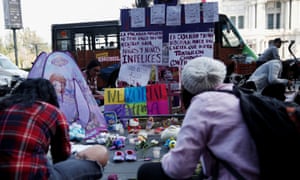Andrés Manuel López Obrador offered vague plans for ‘moral regeneration’ after string of gruesome killings of women and girls
HE IS A NEO LIBERAL IN SOCIAL DEMOCRATIC CLOTHING
David Agren in Mexico City @el_reportero
Fri 21 Feb 2020

Demonstrators start a fire as they gather outside the national palace in Mexico City, Mexico, on Tuesday to protest against gender violence. Photograph: Alfredo Estrella/AFP via Getty Images
Mexico’s president has cast himself as the victim of feminist activists, amid an outburst of fury at the alarming violence targeting the country’s women and girls – and the seeming impunity that accompanies each crime.
A string of especially gruesome killings of women and girls has prompted widespread protests, especially in the capital. In one incident last week, masked women splashed blood-red paint on the doors of the national palace and sprayed the walls with graffiti.

‘It fills us with rage’: Mexican activists protest femicide at presidential palace
But Mexico’s president, Andrés Manuel López Obrador, has been accused of a tone-deaf response to the crisis as he offers vague plans for “moral regeneration” and protestations that all murders matter.
At his morning press conference on Thursday, he mused about the a “feminist collective” that had descended on the palace. “They opposed the moral regeneration we’re promoting. I respect their views but don’t share them. I believe we have to moralise the country, purify public life and strengthen cultural, moral and spiritual values,” he said.
“I’m not going to give up my lifelong beliefs because they came and protested. We’re going to struggle to achieve a material change, a spiritual change.”
Endless stories on horrific murders – and daily indignities such as harassment, catcalls and being groped on public transit – have prompted a burgeoning women’s movement, whose members have protested online and in the streets and called for a national women’s strike on 9 March.
Mexico’s president has cast himself as the victim of feminist activists, amid an outburst of fury at the alarming violence targeting the country’s women and girls – and the seeming impunity that accompanies each crime.
A string of especially gruesome killings of women and girls has prompted widespread protests, especially in the capital. In one incident last week, masked women splashed blood-red paint on the doors of the national palace and sprayed the walls with graffiti.

‘It fills us with rage’: Mexican activists protest femicide at presidential palace
But Mexico’s president, Andrés Manuel López Obrador, has been accused of a tone-deaf response to the crisis as he offers vague plans for “moral regeneration” and protestations that all murders matter.
At his morning press conference on Thursday, he mused about the a “feminist collective” that had descended on the palace. “They opposed the moral regeneration we’re promoting. I respect their views but don’t share them. I believe we have to moralise the country, purify public life and strengthen cultural, moral and spiritual values,” he said.
“I’m not going to give up my lifelong beliefs because they came and protested. We’re going to struggle to achieve a material change, a spiritual change.”
Endless stories on horrific murders – and daily indignities such as harassment, catcalls and being groped on public transit – have prompted a burgeoning women’s movement, whose members have protested online and in the streets and called for a national women’s strike on 9 March.

People gather in memory of seven-year-old Fátima Aldrighetti Antón at an anti-femicide monument in Mexico City, Mexico, on Wednesday. Photograph: Carlos Jasso/Reuters
In recent years, Mexican women have become increasingly ready to call out callous and inept responses from public officials, police and prosecutors in cases of femicides, but in some cases politicians have appeared to show more concern over feminist graffiti than the crimes committed against women.
Much of the recent outrage, however, has targeted López Obrador, who identifies as left-leaning but has appeared exasperated by calls to confront the issue.
This month, he responded to a question about the federal prosecutor’s proposal to scratch the concept of femicides from the criminal code by saying the issue “has been manipulated by the media”.
He also showed annoyance that the question interrupted his plans to talk about his pet project of raffling off the presidential airplane, saying: “I don’t want femicides to overshadow the lottery.”

'Why did she have to die?' Mexico's war on women claims young artist
Women’s groups say he is treating femicides in the same way as his predecessors: as a political and public relations problems rather than a crisis claiming the lives of women.
“The message he’s sending women is: I don’t care,” said Maricruz Ocampo, an activist in the state of Querétaro.
“They’ve all had the same attitude toward the problem,” she said. “This is a Mexican problem, not a women’s issue.”
Several recent high-profile crimes have been especially gruesome.
Ingrid Escamilla, 25, was murdered on 9 February by her husband, who skinned her corpse and disemboweled her. A tabloid newspaper fueled further anger by publishing photos of her corpse on its front page.
In the second crime, a seven-year-old girl, Fátima Aldrighetti Antón, was abducted and tortured after her mother got stuck in traffic and was late to pick her up from school. Her body was found in a plastic bag four days later, showing signs of torture. Two suspects were arrested on Wednesday – but not after Mexico City officials leaked information on the complicated domestic situation in Fátima’s home.

People embrace as they gather in memory of Fátima Aldrighetti Antó at an anti-femicide monument in Mexico City, Mexico, on 19 February. Photograph: Carlos Jasso/Reuters
López Obrador responded Tuesday to questions about the femicides by blaming family breakdowns, along with “neoliberal” policies implemented over the past three decades.
He also cast the blame on his predecessors – including those in Mexico City, where he governed from 2000-2005 and has heavily influenced local politics since leaving office.
“Not only is nothing being done today, but what’s being said is discrediting women,” said Regina Tamés, director of Gire, a reproductive rights organisation.
López Obrador swept to power promising widespread social change but has consistently showed conservative tendencies on social issues. “What’s unfortunate about now, in comparison to before, is people have put a lot of hope of change in this government,” Tamés said.
No comments:
Post a Comment